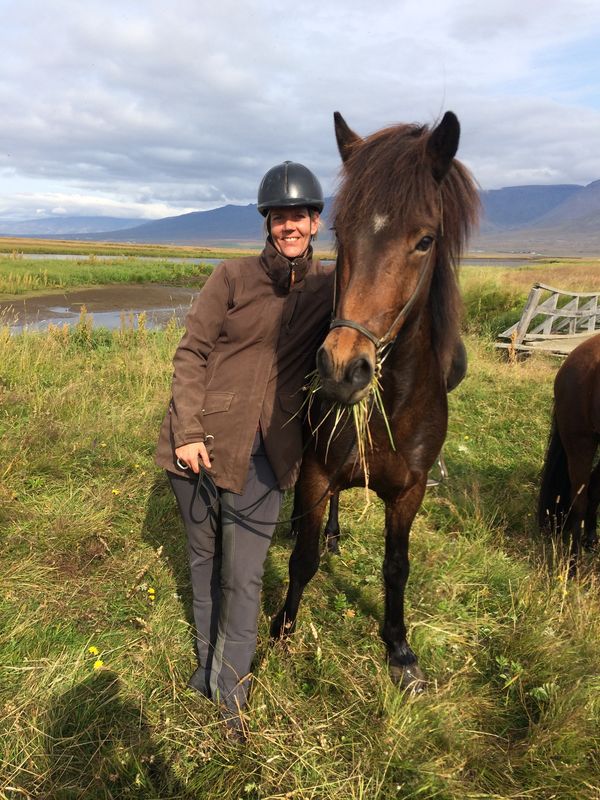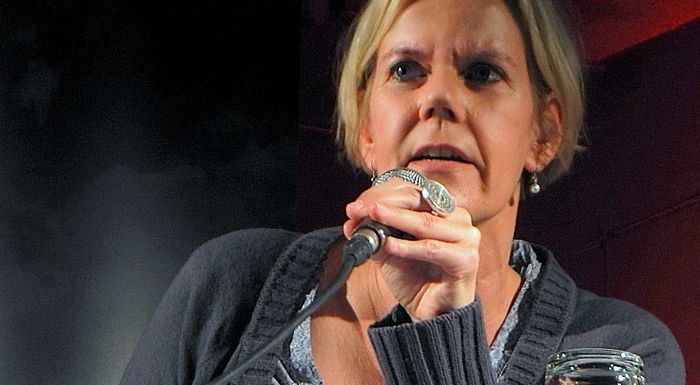Icelanders express themselves through stories
“For authors that come from minority language areas, translations are a lifeline, both from a literary but also financial point of view. But my job is to first and foremost bring Icelandic literature to a German readership.”
Tina Flecken is a translator of Icelandic literature into German and in this interview with Magnús Guðmundsson she speaks of her dream project, life in an Icelandic farm and the many books she has translated.
“I was ninenteen years old and, to be honest, I don't know why I chose Iceland, but I think it was because I just felt it was so exotic and exciting,” says the translator Tina Flecken. Over the years, Tina has translated many Icelandic literary works into German, but she first came to Iceland as an exchange student in 1987. “I wasn't in school, though, but mainly working and getting to know Icelandic culture.”
My interest was sparked at a poetry festival
“That year I stayed in, among other places, a farm in Yzta-Bæli under the Eyjafjöll mountains, and also worked in a fish factory in Ísafjörður and did all kinds of bits and bobs, as they say. In Yzta-Bæli there was an elderly couple, very good people, but they spoke neither German nor English so I had no choice but to learn some Icelandic. It was actually very relaxed and there was no great need to talk much, but I learned enough to get by,” says Tina light-heartedly.
“After that year in Iceland, I discovered a longing to learn more languages and went to university in Germany. I started off by studying Swedish to learn a language that might prove more useful than Icelandic, and I also studied German and English.”
Tina says that, even though she decided to place more emphasis on languages other than Icelandic, the country continued to draw her. “I was totally in love with Iceland, so I came back and enrolled for the Icelandic for Foreign Students course at the University of Iceland in for two years.
My interest in translating was triggered at University here in Cologne. We were organising a poetry festival and invited some Nordic poets and the writers who came included Sjón and Steinunn Sigurðardóttir. We students practiced translating their poems and I found it really fun. After that I was always thinking of translating, but at that time very little Icelandic literature was being translated into German.”
Tina says that she therefore put Icelandic aside for a few years and started to work for a publisher in Cologne when she graduated.
By coincidence, I was then asked to translate a novel by Mikael Torfason and immediately accepted. This was around the same time as I started to work in Literaturhaus in Köln and after that I started to look for more works to translate.
Dream of seclusion
Over the past years, the list of works which Tina has managed to translate is incredibly long and varied. She says a lot of interest in Icelandic literature started when Iceland was the Guest of Honour at the Frankfurt Book Fair in 2011. “That interest has been kept alive ever since and now I work exclusively translating from Icelandic. There aren't many of us in this field so there's more than enough to do.”
When asked what it was that made Icelandic literature so popular in Germany, Tina says that's certainly interesting food for thought. “There has actually always been a connection between Iceland and Germany over the ages. The interest in ancient literature has always been very strong here, for example. It's the Germanic connection. But today so many people travel to Iceland and the country seems to be a kind of dream land for many Germans.”
People are drawn to Iceland because of the beauty of its nature, but also because Germany has such a vast and dense population. Many people long for the seclusion that can be found in the wilderness of Iceland and many tourists aren't just interested in the nature, but also all things Icelandic. It can be horses, music and literature and all of that has an impact.
Tina says that she also sensed that seclusion when she first came to Iceland from Cologne, which has a population of over a million and that had been a powerful experience. “But sometimes I also missed being in a crowd, to be one in a multitude, because in Iceland everyone knows everyone. When I was under the Eyjafjöll mountains it was so good to be the only foreigner in the area and people came from neighbouring farms to look at me,” says Tina, laughing at the memory. “That's all changed, of course, but in those days I sometimes enjoyed popping into the Kringla shopping mall to be among people and get that petit bourgeois feeling, although on the whole I enjoyed it.”
It's fun to see the number and variety of books Tina has translated over the years. It's also noteworthy how many names on her list would be considered as belonging to the younger generation, with authors such as Gerður Kristný, Guðrún Eva Mínervudóttir, Andri Snær Magnason and now recently Sigríður Hagalín.
That unique tone
Tina says she accepts the assignments she is offered for the simple reason that she is trying to make a living from her translation work. “But on the other hand I also think it's fun to translate different kinds of material and that prevents me from feeling that I'm repeating myself. I've also translated many books by Yrsa, for example, which I always enjoy, although I wouldn't like to be translating crime fiction all the time, because the exciting thing about every book is trying to strike that unique tone which is in the original text in each case. That's what's difficult, but also what's fun.”
Tina says that translations generally take some time, but that occasionally they go incredibly fast. “Sometimes I sense I've got the feeling for it after just a few pages and it generally flows smoothly after that. Unfortunately it isn't always that easy, but nevertheless it's that search that makes this job most alluring.”
When asked whether there is something that characterises Icelandic literature or distinguishes it from others, Tina says that it's difficult to say.
It's a very broad field but perhaps what distinguishes Icelandic authors the most is how much they enjoy telling stories.
“It's something one feels when one meets Icelanders as well because they are always telling stories rather than talking about themselves. Expressing oneself through stories is obviously a prominent element in literature, even though it may be somewhat abstract. But otherwise Icelandic literature covers everything and doesn't conform to exactly what one expects literature to be,” says Tina, pondering a moment before she adds: “not to mention that there is a lot about the weather and various things that can be considered particularly Icelandic and become apparent when one starts to translate because various problems crop up. It can be difficult to translate when there are so many words in Icelandic for the wind, snow and all kinds of weather. But that's just a fun challenge.”
Need to find a new dream
Last April, Tina ran a translators workshop in collaboration with Gauti Kristmannsson, where both Icelandic and German translators gathered in Seyðisfjörður in east of Iceland. Tina says workshops like these are extremely important. “The first workshop of this kind was in Germany four years ago, bringing together both Icelandic and German translators. It was both fun and educational because these people have so much in common in this job. There are countless things that need to be discussed and gatherings like these are important to make one a better translator when it's over.”
Tina clearly intends to continue translating from Icelandic, but when asked about the status of the language she says she obviously follows the debate. “I'm aware of the risks and if Icelandic were to disappear that would be absolutely awful. But I don't think there is any great danger of that, as some people believe, because languages are always changing and Icelandic is no exception. The problem is that Icelandic is so old and that makes this debate that little bit more complex because it fuels fears for the future of the language. But personally I also think it's exciting to see how Icelandic will evolve and change in the future because change is inevitable and has always been at work.”
Tina points out that translating into other languages is also an important element in boosting Icelandic.
For authors that come from minority language areas, translations are a lifeline, both from a literary but also financial point of view. But my job is to first and foremost bring Icelandic literature to a German readership.
But does Tina perhaps have some dream project in that journey? “Yes, but my dream project has already been translated so that killed my dream,” says Tina, bursting into laughter. “My dream was always to translate Pétur Gunnarsson's Andri series, because I wrote my final thesis on those books at the university in Iceland and in Germany. But they had already all been translated and quite brilliantly, so I just have to find a new dream.”
Interview: Magnús Guðmundsson
Translation: Brian FitzGibbon

